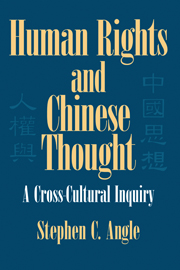Book contents
- Frontmatter
- Contents
- Preface and Acknowledgments
- Chronology
- Chapter 1 Introduction
- Chapter 2 Languages, Concepts, and Pluralism
- Chapter 3 The Consequences of Pluralism
- Chapter 4 The Shift toward Legitimate Desires in Neo-Confucianism
- Chapter 5 Nineteenth-Century Origins
- Chapter 6 Dynamism in the Early Twentieth Century
- Chapter 7 Change, Continuity, and Convergence prior to 1949
- Chapter 8 Engagement despite Distinctiveness
- Chapter 9 Conclusions
- Bibliography
- Glossary and Index
Chapter 1 - Introduction
Published online by Cambridge University Press: 14 August 2009
- Frontmatter
- Contents
- Preface and Acknowledgments
- Chronology
- Chapter 1 Introduction
- Chapter 2 Languages, Concepts, and Pluralism
- Chapter 3 The Consequences of Pluralism
- Chapter 4 The Shift toward Legitimate Desires in Neo-Confucianism
- Chapter 5 Nineteenth-Century Origins
- Chapter 6 Dynamism in the Early Twentieth Century
- Chapter 7 Change, Continuity, and Convergence prior to 1949
- Chapter 8 Engagement despite Distinctiveness
- Chapter 9 Conclusions
- Bibliography
- Glossary and Index
Summary
In June Of 1993, His Excellency Mr. Liu Huaqiu, head of the Chinese delegation, made the following statement in the course of his remarks to the United Nations World Conference on Human Rights in Vienna:
The concept of human rights is a product of historical development. It is closely associated with specific social, political, and economic conditions and the specific history, culture, and values of a particular country. Different historical development stages have different human rights requirements. Countries at different development stages or with different historical traditions and cultural back-grounds also have different understanding and practice of human rights. Thus, one should not and cannot think of the human rights standard and model of certain countries as the only proper ones and demand all countries to comply with them.
[Liu Huaqiu 1995, p. 214]This statement contains two claims: first, that countries can have different concepts of human rights, and second, that we ought not demand that countries comply with human rights concepts different from their own. The principal goal of this book is to assess these two claims.
It is important that we know what to make of these two claims, for reasons that range from the immediate and practical to the broadly theoretical. Assessment of the two claims should influence activists and international lawyers, both within China and without.
- Type
- Chapter
- Information
- Human Rights in Chinese ThoughtA Cross-Cultural Inquiry, pp. 1 - 25Publisher: Cambridge University PressPrint publication year: 2002



